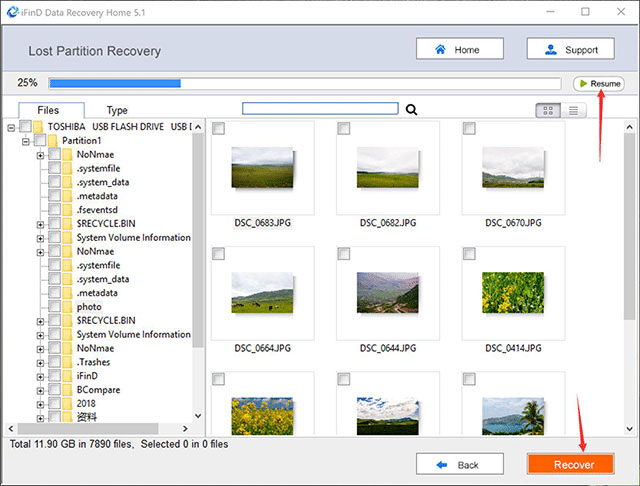Nowadays we need to store more and more data, then the U disk cannot meet our needs. As a result, the external hard disk stands out. Compared with u disk, the external hard disk has many advantages.
- The characteristics of large capacity.
- Fast transmission speed.
- Stable performance.
However, the data loss of the external hard disk is the highest among all storage devices. We are facing much more external hard drive recovery problems nowadays.
In addition to the error deletion, there are two types of failures that mobile hard disks often encounter.
- Hard disk damaged, unable to open it.
- Device not recognized.
Next, we will discuss these two problems and discuss how to deal with them.
1, Damaged External Hard Drive
We often encounter this situation when we use the external hard disk: the external hard disk is connected properly, the operating system can correctly display the drive letter and icons of the external hard disk, but when you double-click the icon, you can’t open the hard drive, and the window below will pop up.

This means the external hard drive is damaged, There are many reasons for this failure. But once that happens, don’t be nervous, we’ll try to fix it at first.
- Press “Windows + X”, then knock “A”, then pop up the terminal program.
- Enter “chkdsk drive letter:/f” in the terminal program, press the enter key, then run the Windows disk repair tool.
- After the disk repair tool running ends, reconnect the external hard disk. If the problem is not solved, we recommend using iFinD Data Recovery to recover the data in the damaged disk.
2: USB Device not Recognized

USB Device not Recognized is probably the most common problem. If you are just a normal user, but not a computer expert. When you have seen this error, you may be at a loss. But don’t worry, let’s talk about why we have this problem. and then, what to do next!
The main reason for the failure:
- The external hard drives are often carried around, so it is easy to be Impacted.
- The external hard disks are usually using USB and IEEE1394 interfaces. after a long-time use, the wear of interfaces may cause the damage of hard disks.
- Virus or malware infection.
- The computer suddenly broke down, or the operating system crashed, or the hard disk connection broke down.
So what we should do NEXT?
How to fix “the USB Device not Recognized”.
Step 1: replace the device’s connection interface or computer.
- Restart the computer. then replace the other interface connect the USB device.
- Replace the other computer to try again.
Step 2: Uninstall the device and then reinstall it.
- Enter “Device Manager”, then you’ll find an “unknown” storage Device.

- Double click on the device and click on the uninstall device.

- Then restart the computer.
If all of the above methods have been tried and the drive is still unrecognizable, your external hard disk should be damaged. In fact, you need to format your device. Don’t worry, we will show you how to use iFinD Data Recovery to recover data to keep your data safe.
3: How to recover the lost data from an external hard drive with iFinD Data Recovery?
Step1: Formatting the device, You will get a normal partition when you finish it, but there are no data in it, temporary.
Don’t open the partition if you formatted it. Most important, don’t copy any files in it. If you don’t do anything about the partition, you will recover all your data which you lost.
Step2: Download and install the latest version of iFinD Data Recovery.
Step3: Select the first feature, “Lost Partition Recovery,” and select the external hard disk you need to restore.

Step4: Select the file you need to restore, and then click “save” to save it on the local device.

Notice: Do not save files on an external hard drive that is being restored. The wrong operation will cause permanent damage to the data, and then, cannot be recovered.
Through the above article, we basically learned what is the external hard disk, as well as the cause of failure of an external hard disk and the processing method. You should be able to deal with the daily life of external hard disk data loss, device unrecognized and other errors. But the most important thing is to take care of your hard drive and keep it properly during everyday use. This minimizes the risk of the data lost.

Andy is an editor of the iFinD Team. She worked in this big family since her graduation. Her articles mainly focus on data backup and recovery, disk cloning, and file syncing, committed to resolving the data loss issues users may encounter on their PCs. Besides, more related computer articles are shared here.

